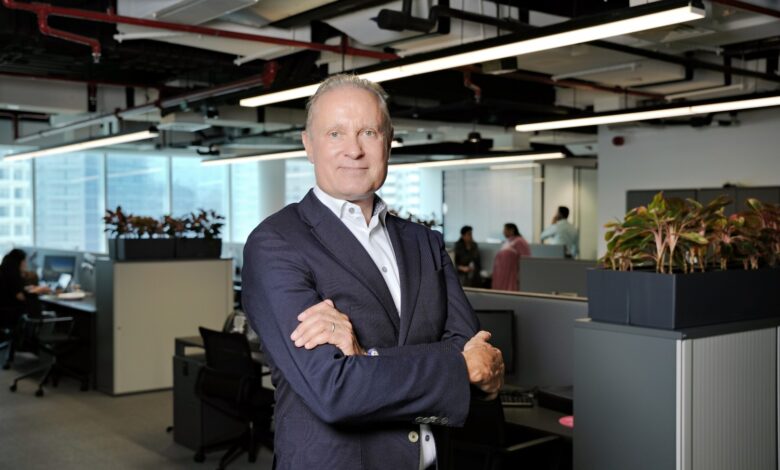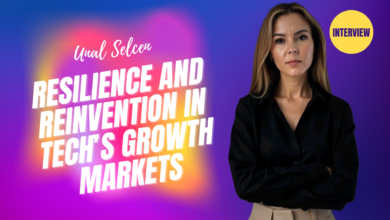Philippe Jarre on Redefining the IT Channel: From Ecosystem Orchestrators to AI-Driven Growth

Since taking the helm at Mindware in 2019, Philippe Jarre has been steering the distributor into a new era of channel transformation. With a career spanning leadership roles at GBM and IBM across Europe and the U.S., Jarre has championed initiatives like Mindware Academy and the MAGIC platform, equipping partners with the skills and platforms needed to thrive in AI, cybersecurity, and cloud. In this interview, he shares insights on the IT channel’s evolution, the pressing talent gap, and how partners can unlock sustainable growth by embracing innovation, specialization, and ecosystem collaboration.
Could you share an overview of your career path to date, highlighting the pivotal moments or achievements that have shaped your leadership within the IT channel?
I joined Mindware in 2019 as President and CEO of the Mindware Group, bringing with me extensive experience from the IT industry including my tenure as CEO of GBM and various leadership roles as General Manager for IBM business units across France, Europe, and the USA. With a strong background in services, I have focused on shaping a compelling value proposition for both our partners and vendors. This includes the launch of innovative initiatives like the Mindware Academy and the MAGIC platform, both designed to foster talent and accelerate partner growth in strategic areas such as AI, cybersecurity, and analytics.
As a key channel influencer within your company, what are your primary roles and responsibilities in shaping strategy, driving engagement, and fostering growth within the partner ecosystem?
As a key channel influencer within my organization, my primary roles and responsibilities revolve around three core pillars:
- Shaping Strategy: I play an active role in defining and refining our go-to-market strategy, ensuring alignment with both vendor priorities and regional market dynamics. This includes identifying emerging technologies, evaluating partner capabilities, and architecting scalable programs that drive relevance and differentiation in a highly competitive landscape.
- Driving Engagement: I serve as a bridge between our vendors and our partner ecosystem, facilitating meaningful engagement through structured enablement, thought leadership, and executive alignment. By cultivating trust and transparency, I help ensure that our partners feel supported, informed, and empowered to deliver value to end customers.
- Fostering Growth: My focus is on sustainable growth through innovation, enablement, and operational excellence. I lead initiatives that support partner transformation—such as cloud migration, AI adoption, and services monetization—while also driving performance through incentives, joint business planning, and ecosystem expansion.
Ultimately, my role is to create an environment where our partners can thrive, accelerating their capabilities, amplifying their reach, and collectively achieving greater impact in the market.
How would you assess the current health and evolution of the IT channel, particularly within our region? What significant trends or shifts are you observing?
The IT channel in the MEA is undergoing a significant transformation, shaped by a combination of digital acceleration, regional investment priorities, geopolitical dynamics, and vendor-driven evolution. It remains one of the fastest-growing markets for IT infrastructure, AI, cloud services, cybersecurity, and digital transformation. Despite global economic uncertainties, spending in sectors like government, energy, banking, and telecom is helping sustain strong channel momentum.
The channel landscape is highly fragmented, with vast differences between mature Gulf markets (e.g., UAE, Saudi Arabia) and emerging African markets. Major vendors are investing heavily in channel enablement, but there is growing pressure on partners to specialize (e.g., in cybersecurity, AI, or data analytics) and demonstrate recurring revenue capabilities. Uptick in AI/ML adoption, particularly in UAE and KSA, is driving interest in edge computing, analytics platforms, and AI-as-a-service.
Traditional distributors are evolving into “ecosystem orchestrators”, integrating cloud platforms, marketplaces, training academies, and financial services. The shortage of cloud architects, cybersecurity specialists, and AI engineers remains a barrier. Distributors and vendors are investing in training programs to upskill partners and attract local talent. Initiatives such as Mindware Academy are playing a key role in addressing this gap by nurturing specialized capabilities within the regional ecosystem.
What do you see as the single biggest challenge facing the IT channel in the region today, and conversely, what is the most significant untapped opportunity for partners?
The IT channel in MEA faces a significant challenge due to the shortage of skilled talent and advanced capabilities needed to deliver complex, high-value solutions in cloud, AI, and cybersecurity. Many partners remain too transactional and struggle to evolve into solution providers or MSPs. Rapid shifts in vendor programs demand technical certifications, business model transformation, and new competencies, which are challenging for many regional partners. Customers increasingly expect outcome-based, subscription-driven engagements rather than just product reselling.
On the other hand, the most significant untapped opportunity lies in helping customers translate digital transformation into industry-specific business value, particularly through AI, data, and cloud-powered services. Governments and large enterprises are pushing digital initiatives, such as smart cities, fintech, e-health, and e-government, but need local partners who understand both technology and business context. There is strong demand for verticalized offerings in sectors like healthcare, retail, energy, and the public sector. Partners who invest in industry knowledge and reusable solution frameworks, such as dashboards, packaged ML models, and sector-specific cloud stacks, can command higher margins and deepen customer relationships.
In your opinion, what are the most effective strategies partners can employ to drive sustainable growth and profitability in the current market, especially considering evolving customer demands?
To drive sustainable growth and profitability in today’s evolving IT market, partners must embrace a strategic, customer-centric, and innovation-driven approach. This involves shifting from transactional selling to value-based solutions that address real customer problems, such as cybersecurity resilience, AI integration, and cloud cost optimization. Adopting and expanding as-a-service offerings, including cloud, managed services, and subscription licensing models, can stabilize cash flow and build long-term customer relationships.
Developing deep industry expertise in sectors like healthcare, finance, and oil & gas allows partners to offer tailored solutions aligned with sector-specific challenges and regulations. Leveraging data and AI for insight-driven selling can predict customer needs, personalize offerings, and improve sales efficiency. Investing in customer success and lifecycle services ensures support across the entire client journey, driving renewals and upsell opportunities. Strengthening vendor alliances provides early access to innovations and joint go-to-market opportunities, especially around AI, cybersecurity, and hybrid cloud.
Continuously upskilling and certifying talent on emerging technologies and consultative selling is crucial to meet evolving buyer expectations and differentiate from low-value competitors. Finally, customizing solutions for regional regulatory, cultural, and language needs, particularly in the diverse MEA region, helps gain trust and relevance in local markets.
How is the rapid advancement of AI, including Agentic AI and Generative AI, fundamentally reshaping the channel’s business models, partner opportunities, and the skill sets required for success?
The rapid advancement of AI, particularly Agentic AI (autonomous task-performing systems) and Generative AI (content, code, and data generation), is profoundly transforming the IT channel landscape. Traditional product resale is evolving into AI-enhanced solutions and services, with partners shifting from resellers to AI orchestrators, embedding AI into business processes and customer environments.
Some partners are developing proprietary AI-powered platforms, tools, or accelerators, creating new IP-based revenue streams beyond vendor margins. Clients now expect AI solutions to deliver measurable business results, pushing partners toward value-based pricing and managed AI services. There is rising demand for partners who can integrate Generative AI into enterprise workflows, deploy autonomous agents for complex tasks, and offer data modernization services.
Partners can add value by advising on responsible AI use, compliance, and risk mitigation. New skill sets are required, including AI literacy for all roles, prompt engineering, model fine-tuning, AI project management, and change management. AI represents a seismic shift in how value is created and delivered in the channel, and success will belong to partners who adapt quickly, build AI-native capabilities, and help customers navigate the complexities of intelligent transformation.
Given the escalating sophistication of cyber threats, how can channel partners best position themselves to deliver comprehensive cybersecurity solutions, moving beyond traditional offerings to address emerging risks like AI evasion?
In the face of escalating cyber threats, such as AI evasion techniques, deepfake fraud, and autonomous attack tools, channel partners must evolve beyond traditional cybersecurity offerings to deliver comprehensive, adaptive, and intelligence-driven solutions. This involves consolidating fragmented tools into integrated security platforms to improve visibility, reduce complexity, and close security gaps.
Emphasizing real-time threat detection, automated response, and AI-enhanced analytics is crucial to defend against sophisticated threats. Partners should use AI-powered cybersecurity tools to detect anomalies, predict risks, and respond autonomously, while also integrating real-time global threat intelligence for proactive risk mitigation. Developing expertise in AI-driven threats, such as AI evasion techniques, deepfake identity fraud, and autonomous malware, positions partners as cyber-AI advisors. Expanding into 24/7 managed security services with human-in-the-loop threat analysis and providing incident response planning and forensics are essential.
Guiding clients toward Zero Trust maturity and offering compliance and governance services help navigate new regulatory requirements. Continuous training and education, along with delivering security awareness training and advisory services, are key to building trust in an increasingly AI-powered threat landscape. Mindware supports partners on this journey through cybersecurity-focused enablement programs, helping build the skills and knowledge needed to address today’s advanced threat landscape.
Environmental, Social, and Governance (ESG) factors and sustainability are gaining prominence. How can channel partners integrate these principles into their operations and offerings to create competitive advantages and meet evolving client expectations?
Channel partners can gain a competitive edge by embedding ESG and sustainability into their operations and offerings. This involves promoting eco-friendly products, adopting sustainable supply chain practices, reducing environmental impact, and transparently reporting on ESG metrics. Educating staff, forging strategic ESG partnerships, and effectively communicating their sustainability efforts help build trust and attract socially conscious clients. Aligning business goals with ESG values and showcasing responsible initiatives enable partners to differentiate themselves, meet evolving client expectations, and capitalize on market trends toward sustainability and corporate responsibility.
The IT landscape demands continuous learning. What advice do you have for channel partners on attracting, developing, and retaining top talent, particularly in areas like AI, cloud security, and specialized industry solutions?
To attract, develop, and retain top talent in areas like AI, cloud security, and specialized industry solutions, channel partners should focus on creating a compelling value proposition for prospective employees by offering opportunities to work on cutting-edge technologies and impactful projects. Investing in ongoing training, certifications, and professional development programs is essential to keep skills current and foster growth.
Building a strong, innovative company culture that emphasizes collaboration, recognition, and a clear career path can boost retention. Leveraging partnerships with educational institutions and industry organizations can help access a pipeline of fresh talent. Providing competitive compensation, flexible work arrangements, and showcasing the organization’s commitment to technology leadership and sustainability will further attract and retain top professionals in these specialized fields.
How do you see the roles of different partner types—such as Managed Service Providers (MSPs), Independent Software Vendors (ISVs), and system integrators—evolving, and how can they best collaborate to deliver integrated solutions?
The roles of different partner types, such as Managed Service Providers (MSPs), Independent Software Vendors (ISVs), and system integrators, are evolving significantly in the IT landscape. MSPs are increasingly focusing on delivering comprehensive managed services that include cloud management, cybersecurity, and AI-driven solutions. ISVs are developing specialized software solutions that cater to specific industry needs, leveraging emerging technologies like AI and machine learning.
System integrators are playing a crucial role in bringing together various technologies and solutions to create cohesive and efficient systems for clients. To deliver integrated solutions, these partner types can collaborate by leveraging their unique strengths. MSPs can provide ongoing management and support, ensuring that the integrated solutions remain up-to-date and secure.
ISVs can offer their specialized software as part of the overall solution, adding value through innovation and customization. System integrators can ensure seamless integration of all components, optimizing performance and efficiency. By working together, these partners can create holistic solutions that address the complex needs of modern businesses, driving growth and innovation in the IT industry.
Drawing from your experience and looking ahead, what is your most crucial piece of advice for partners seeking long-term success and relevance in this rapidly transforming IT channel?
Drawing from my experience and looking ahead, my most crucial piece of advice for partners seeking long-term success and relevance in this rapidly transforming IT channel is to embrace continuous innovation and adaptability. The IT landscape is evolving at an unprecedented pace, driven by advancements in AI, cloud computing, cybersecurity, and other emerging technologies. To stay ahead, partners must be willing to continuously learn, adapt, and innovate.
This means investing in upskilling their teams, staying abreast of the latest technological trends, and being agile in their approach to business models and customer engagement. By fostering a culture of innovation and adaptability, partners can not only meet the changing demands of the market but also drive sustainable growth and build lasting relationships with their clients.




